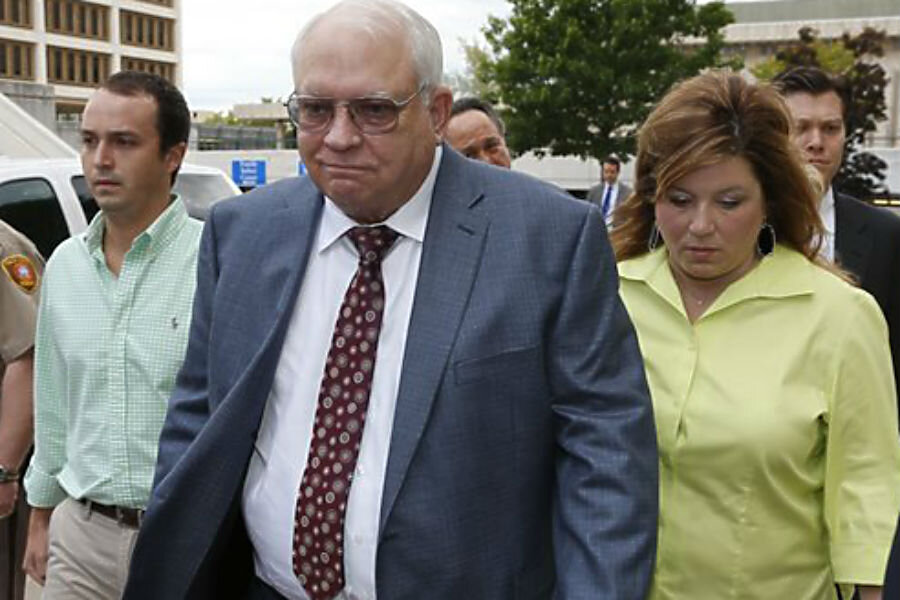Tulsa volunteer deputy, who shot a man, had history of performance complaints
Loading...
| Tulsa, Okla.
Several members of an Oklahoma sheriff's department raised serious concerns years ago about the performance and training of a volunteer deputy now charged in the fatal shooting of a restrained suspect, according to a report released by lawyers for the dead man's family.
Lawyers for Eric Harris' family on Friday released a Tulsa County Sheriff's Office memo outlining an investigation into Robert Bates, 73. Bates says he confused his handgun for his stun gun during an April 2 sting involving gun sales and has pleaded not guilty to second-degree manslaughter in Harris' death.
Bates is a longtime friend to Sheriff Stanley Glanz, serving as his insurance agent for 25 years and his re-election campaign manager in 2012. Bates is white and Harris was black, but the victim's brother has said he doesn't believe the shooting was racially motivated.
The 2009 report says Bates, who had joined the Tulsa County Sheriff's Office less than a year earlier, had argued with a dispatcher, improperly used a personal vehicle on the job and had inadequate training for a role as an advanced reserve deputy.
It concludes that Bates didn't receive special treatment by being admitted to the program because no advanced deputy had fully met internal standards. However, it found he did receive special treatment in other ways, including department leaders' ignoring complaints about his performance.
Bates' lawyer, Clark Brewster, said in an email that it was "admirable" that any complaints were "genuinely investigated for truth and corrective action."
Meredith Baker, an attorney for the sheriff's office, said in a prepared statement Friday that no action was taken as a result of the report, but that the document's existence "demonstrates this office's willingness to investigate and review any allegations of policy violations."
Baker also said the report's release was unauthorized and that the office was looking into the leak.
Bates had 63 hours of state-mandated training in his first 11 months with the Sheriff's Office. In the year after the report, he completed just 47 hours, according to records Bates provided last week from the Council on Law Enforcement Education and Training.
Records obtained from the sheriff's office show that Bates has donated tens of thousands of dollars in cars, SUVs and equipment to the department over the past 10 years. The report released Friday says he donated his car and it was subsequently assigned to him after a complaint that he was driving his personal vehicle while on-duty.
Sgt. Randy Chapman told investigators that no other reserve deputy had such an arrangement. Chapman, who supervised reserve deputies, also told investigators that two of Bates' peers said his field operations "were a little scary."
Chapman, who declined to comment Friday to AP, said in the report that he had complained that Bates shouldn't be allowed to rely on a year's worth of service with the Tulsa Police Department in the mid-1960s to qualify as a present-day law enforcement officer. Chapman said he was reassigned after raising concerns about Bates' performance.
The 13-page report is dated Aug. 12, 2009, but several interviews were held as much as two weeks later. A spokeswoman for Harris' lawyer, Dan Smolen, said the interviews were added as supplements to the original report.
Dozens of residents rallied at a courthouse Friday evening and called for Sheriff Glanz's resignation.
"I feel like it's time the good-old-boy club is broken up in Tulsa," said resident Pamela Smith.
A spokesman for Glanz said the sheriff had no plans to resign.
Separately Friday, local prosecutors issued a statement saying an outside agency should investigate the entire operation under Glanz, who has been in office since 1989.
"I am highly concerned about recent allegations that have surfaced and I have been in contact with independent law enforcement agencies regarding further investigation into these matters," District Attorney Steve Kunzweiler said. He did not elaborate.
The Oklahoma State Bureau of Investigation said it wasn't looking into the matter; Glanz is on the commission that oversees the agency. The local Department of Justice and FBI offices would not say whether they are looking into it.
The report's cover letter says it was prepared by Sgt. Rob Lillard at the request of then-Undersheriff Brian Edwards, who no longer works for the office. Edwards said he can't recall why he ordered the review. He did not respond to questions after the AP forwarded him a copy of the report, and Lillard didn't respond to an email requesting comment.
___
Associated Press writer Allen Reed in Little Rock, Arkansas, contributed to this report.







